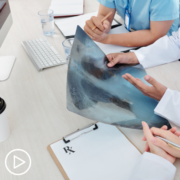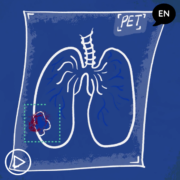Combat and Courage | A Veteran’s Lung Cancer Battle
Combat and Courage: A Veteran’s Lung Cancer Battle from Patient Empowerment Network on Vimeo.
Derrick, a resilient veteran and lung cancer survivor graciously opens up about his journey, detailing his experience from initial screening and diagnosis through to treatment. He candidly discusses crucial aspects of lung cancer care for veterans and offers insights drawn from his journey. In Derrick’s own heartfelt words, he emphasizes the importance of empowerment through knowledge, stating, “It’s your body and your life, and you deserve to learn all you can to gain knowledge and confidence about your cancer.”
Download Resource Guide | Descargar guía de recursos
See More from [ACT]IVATED NSCLC Veterans
Related Resources:
Transcript:
Derrick:
Being ACTIVATED in your lung cancer care is a necessity, take it from me.
After my friend who I served with in Iraq was diagnosed with lung cancer, I knew that it was time to get serious about my lung cancer screenings at the Veterans Affairs Hospital. As a lung cancer survivor, I want to share my story as a Black military veteran. Lung cancer is the leading cause of cancer-related death in veterans, and Black veterans are less likely to complete lung cancer screening. However, a recent VA report showed that Black veterans receive equal or superior care through VA hospitals in comparison to Black patients in the general population.
I was already 52 when I received my first lung cancer screening. I only learned later that I should have started receiving screening at age 50 at the VA. It was winter when I went in for my screening. I’d had a nagging cough but didn’t think twice about it. It was a winter season with multiple respiratory viruses circulating at the time. I was shocked when the radiologist informed my doctor that they found a spot on one of my lungs. I felt like I wasn’t old enough to have cancer.
I was really nervous about it beforehand, but I had surgery to remove the tumor from my lung. I felt fortunate to have my friend I served with to talk with about lung cancer, but I know not everyone is this fortunate. I’m sharing my story in the hopes that it will help other veterans. I continue to receive regular scans of my lungs and urge other veterans to start your lung cancer screening on schedule. Ask your doctor or VA administrator if you’re unsure about when you should start. It’s your body and your life, and you deserve to learn all you can to gain knowledge and confidence about your cancer.
There have been a lot of recent advancements in lung cancer diagnosis and treatment. I hope that sharing my perspective will make a difference for other veterans. We served proudly for our country, and we deserve the best lung cancer screening and care as part of the respect that we earned.
Stay [ACT]IVATED with these tips.
- Don’t allow stigmas to keep you from getting the best care, now is the time to get the right care no matter how you got the cancer.
- Ask your care team questions to learn about treatment options and what to expect during and after treatment.
- Ask if a clinical trial may be a potential treatment option for you.
- Stay abreast of lung cancer treatment options and research advancements
Whether it’s combat in war or fighting cancer, no matter who you are, being proactive is everything. Stay [ACT]IVATED by being informed, empowered, and engaged in your care.






